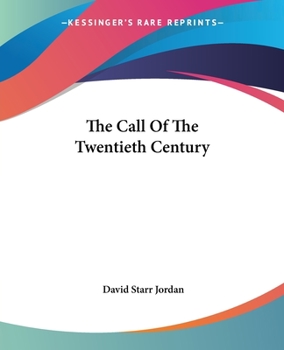The Call Of The Twentieth Century
Select Format
Select Condition 
Book Overview
The Call of the Twentieth Century is a book written by David Starr Jordan, first published in 1902. It is a philosophical and sociological work that explores the challenges and opportunities of the modern era. Jordan argues that the twentieth century is a time of great change and progress, but also of great danger and uncertainty. He believes that the key to success in this new age is a combination of scientific knowledge, ethical values, and social responsibility. The book is divided into three parts. The first part discusses the nature of progress and the role of science in shaping the future. Jordan argues that science is the driving force behind progress, but that it must be tempered by ethical considerations and a concern for the common good. The second part of the book focuses on the challenges of the modern world, including the rise of industrialization, urbanization, and globalization. Jordan argues that these changes are both necessary and inevitable, but that they also pose significant challenges to human society. The final part of the book offers a vision for the future, in which science and ethics work together to create a better world. Jordan believes that the key to this future is education, both in the sciences and in the humanities. He argues that a well-educated population is essential for creating a just and prosperous society. Overall, The Call of the Twentieth Century is a thought-provoking work that explores some of the most important issues of its time. It offers a unique perspective on the challenges and opportunities of the modern era, and provides a compelling vision for a better future.Democracy does not mean equality--just the reverse of this, it means individual responsibility, equality before the law, of course--equality of opportunity, but no other equality save that won by faithful service. That social system which bids men rise must also let them fall if they cannot maintain themselves. To choose the right man means the dismissal of the wrong. The weak, the incompetent, the untrained, the dissipated find no growing welcome in the century which is coming. It will have no place for unskilled laborers.This scarce antiquarian book is a facsimile reprint of the old original and may contain some imperfections such as library marks and notations. Because we believe this work is culturally important, we have made it available as part of our commitment for protecting, preserving, and promoting the world's literature in affordable, high quality, modern editions, that are true to their original work.
Format:Paperback
Language:English
ISBN:1419155695
ISBN13:9781419155697
Release Date:June 2004
Publisher:Kessinger Publishing
Length:48 Pages
Weight:0.22 lbs.
Dimensions:0.1" x 7.5" x 9.2"
Customer Reviews
0 rating





